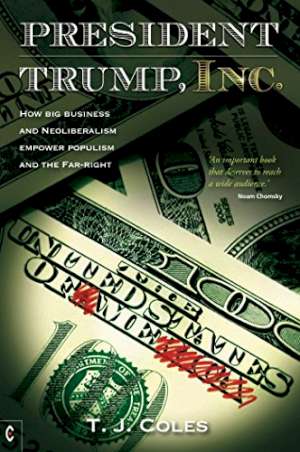05 December 2017
President Trump, Inc.
How Big Business and Neoliberalism Empower Populism and the Far Right
T J Coles
2017, Clairview Books, 222 pages,
ISBN 9781905570874
Reviewer: Dr Rebecca Harding, CEO, Equant Analytics

“For all his bravado and arrogance, Trump is merely following the precedents set by other Presidents,” argues T.J. Coles towards the end of this engaging book. The book’s central argument is that President Trump’s far right (or Alt Right) agenda is taking advantage of the populist sentiment among largely white, middle-class, middle-aged and rural Americans. He takes the economic insecurity and the attendant cultural backlash against immigration and regulation to evoke a common enemy of ‘neo-liberalism’ and globalisation. But while doing this, he is actually following through an agenda that promotes both globalisation on America’s terms and the hegemony of America’s wealthy elites.
The author is clearly angry about the deception that this represents. There are manifest examples of why neoliberal, right-wing thinking is at best paradoxical and at worst misleading when it comes to the voters who most need their politicians to address issues of income inequality, static real wage growth and the increasing costs of healthcare. Voters are, he argues, conflating a reduction in the number of jobs in the US with migration, inequality with the excessive rewards for creative destruction and entrepreneurship, and rising healthcare costs and a perceived lack of freedom with flat wages and obstructive regulation. Most of all, he argues, the populism that this sense of unfairness evokes, is fed by a far right or Alt-Right rhetoric that aligns left and right against a global establishment to create a nationalism tending to enhance rather than undermine the power of the ruling classes.
Ironically perhaps, this might reassure the reader slightly. If Donald Trump is actually working in the interest of maintaining the status quo, then all his tweets and invocations of enemies and threats to America may just be rhetorical in order to remind voters that this is what they wanted. By demonstrating that the FBI, and even some of the more ‘liberal’ media organisations did not support Hillary Clinton in her bid to become US President, and by pointing out the number of conflicts in which the US was involved under President Obama, he is suggesting that the Democrats are no better; perhaps it is politics that is at fault rather than individual politicians.
However, the narrative does not go so far as to present a credible mechanism for connecting the very real and valid concerns of the electorate across the world with a new politics that addresses inequalities and exclusion without undermining the multilateral global system that has evolved since the Second World War. There is plenty of anger about what is going on, but little by way of resolution which leaves the reader a little frustrated that the ‘so what?’ question has not been answered.
This is nevertheless a good and entertaining read. It doesn’t tell us much that we didn’t know or suspect anyway and doesn’t give us any answers. But the style is engaging and the points about the disconnect between voters and politics in Europe and the US well made. It is succinct and is a very good summary of the debates on populism, nationalism and political extremism. And in the end, maybe there isn’t an answer to the ‘So What?’ question at the moment.
